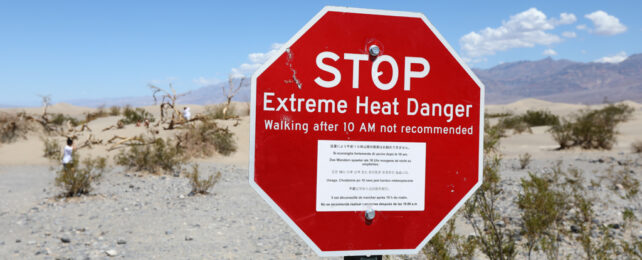Intense, relentless heat waves have become the new normal, fueling climate change and exacerbating droughts and wildfires.
June was the hottest month on record, but July is set to be even worse. The beginning of the month was Earth's hottest week on record, per early data from the World Meteorological Organization.
Excessive heat warnings and heat advisories now cover over 100 million people in the US, per National Weather Service.
The climate in the West is particularly punishing. California's Death Valley could topple the hottest temperature recorded this weekend amid what the US National Weather Service dubbed "sweltering and dangerous heat."
The organization urged citizens to "practice heat safely," such as staying hydrated and avoiding strenuous outdoor activity.
Summer temperatures in the infamously dry national park often top 120 Fahrenheit (49 Celsius), according to the National Parks Service. That's because the surrounding mountains trap hot air in the valley's long and narrow basin.
Heat could surpass 130 Fahrenheit this weekend, the record for the hottest temperature ever reliably measured on Earth, according to the Scientific American.
People in Phoenix, Arizona, have also been treated for second-degree burns caused by red-hot sidewalks, according to the Independent. Temperatures there have soared above 110 Fahrenheit for two weeks.
The US is not an anomaly. Heatwaves are scorching Europe, the Middle East, and southeastern Turkey, and Morocco has issued an alert for extreme heat for parts of the country.
Humans have released so much carbon dioxide and methane that it has changed the Earth's climate, contributing to more frequent and long-lasting extreme weather events.
Consecutive years of drought and above-average temperatures have made Uruguay's only freshwater reservoir almost dry. More than half of the country's population doesn't have access to safe tap water, per the Guardian.
Climate stresses are also hitting northern Argentina and southern Patagonia. Similarly, in Iraq, water shortages are having a knock-on effect on agriculture and food production.
"The extreme weather – an increasingly frequent occurrence in our warming climate – is having a major impact on human health, ecosystems, economies, agriculture, energy, and water supplies. This underlines the increasing urgency of cutting greenhouse gas emissions as quickly and as deeply as possible," World Meteorological Organization secretary-general Petteri Taalas said.
This article was originally published by Business Insider.
More from Business Insider: